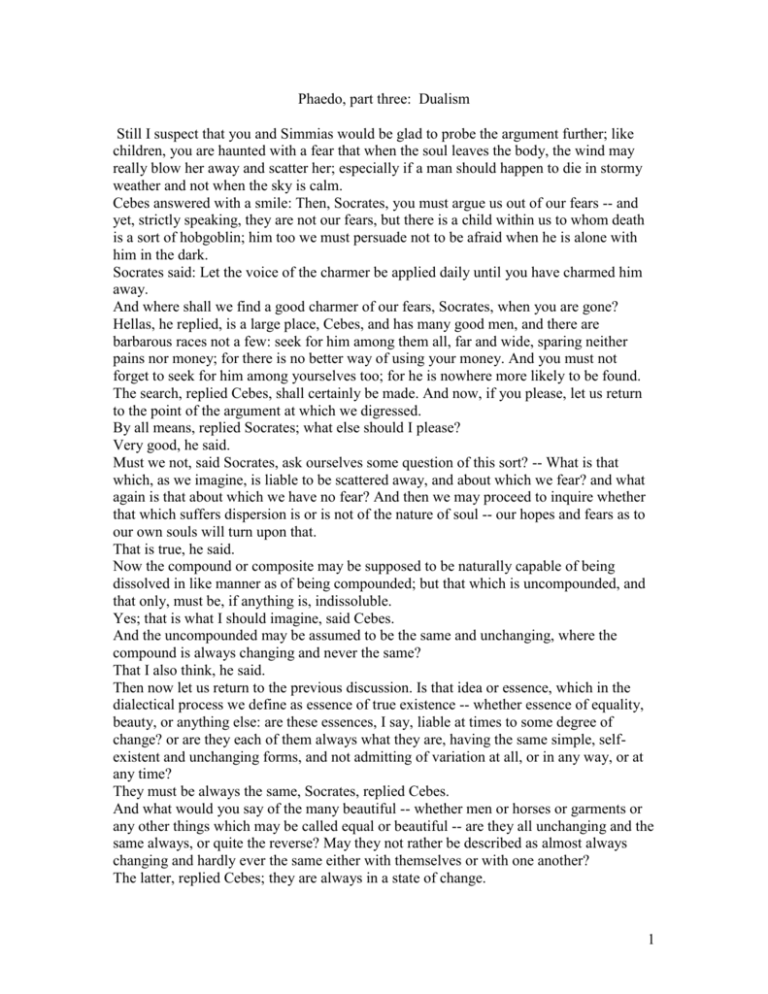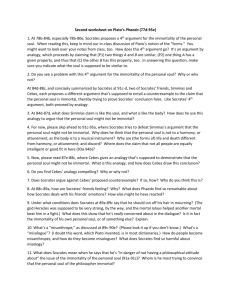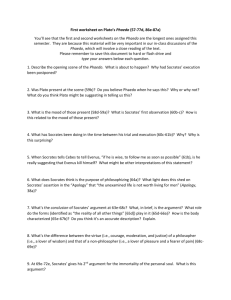Phaedo, part three: Dualism
advertisement

Phaedo, part three: Dualism Still I suspect that you and Simmias would be glad to probe the argument further; like children, you are haunted with a fear that when the soul leaves the body, the wind may really blow her away and scatter her; especially if a man should happen to die in stormy weather and not when the sky is calm. Cebes answered with a smile: Then, Socrates, you must argue us out of our fears -- and yet, strictly speaking, they are not our fears, but there is a child within us to whom death is a sort of hobgoblin; him too we must persuade not to be afraid when he is alone with him in the dark. Socrates said: Let the voice of the charmer be applied daily until you have charmed him away. And where shall we find a good charmer of our fears, Socrates, when you are gone? Hellas, he replied, is a large place, Cebes, and has many good men, and there are barbarous races not a few: seek for him among them all, far and wide, sparing neither pains nor money; for there is no better way of using your money. And you must not forget to seek for him among yourselves too; for he is nowhere more likely to be found. The search, replied Cebes, shall certainly be made. And now, if you please, let us return to the point of the argument at which we digressed. By all means, replied Socrates; what else should I please? Very good, he said. Must we not, said Socrates, ask ourselves some question of this sort? -- What is that which, as we imagine, is liable to be scattered away, and about which we fear? and what again is that about which we have no fear? And then we may proceed to inquire whether that which suffers dispersion is or is not of the nature of soul -- our hopes and fears as to our own souls will turn upon that. That is true, he said. Now the compound or composite may be supposed to be naturally capable of being dissolved in like manner as of being compounded; but that which is uncompounded, and that only, must be, if anything is, indissoluble. Yes; that is what I should imagine, said Cebes. And the uncompounded may be assumed to be the same and unchanging, where the compound is always changing and never the same? That I also think, he said. Then now let us return to the previous discussion. Is that idea or essence, which in the dialectical process we define as essence of true existence -- whether essence of equality, beauty, or anything else: are these essences, I say, liable at times to some degree of change? or are they each of them always what they are, having the same simple, selfexistent and unchanging forms, and not admitting of variation at all, or in any way, or at any time? They must be always the same, Socrates, replied Cebes. And what would you say of the many beautiful -- whether men or horses or garments or any other things which may be called equal or beautiful -- are they all unchanging and the same always, or quite the reverse? May they not rather be described as almost always changing and hardly ever the same either with themselves or with one another? The latter, replied Cebes; they are always in a state of change. 1 And these you can touch and see and perceive with the senses, but the unchanging things you can only perceive with the mind -- they are invisible and are not seen? That is very true, he said. Well, then, he added, let us suppose that there are two sorts of existences, one seen, the other unseen. Let us suppose them. The seen is the changing, and the unseen is the unchanging. That may be also supposed. And, further, is not one part of us body, and the rest of us soul? To be sure. And to which class may we say that the body is more alike and akin? Clearly to the seen: no one can doubt that. And is the soul seen or not seen? Not by man, Socrates. And by "seen" and "not seen" is meant by us that which is or is not visible to the eye of man? Yes, to the eye of man. And what do we say of the soul? is that seen or not seen? Not seen. Unseen then? Yes. Then the soul is more like to the unseen, and the body to the seen? That is most certain, Socrates. And were we not saying long ago that the soul when using the body as an instrument of perception, that is to say, when using the sense of sight or hearing or some other sense (for the meaning of perceiving through the body is perceiving through the senses) -- were we not saying that the soul too is then dragged by the body into the region of the changeable, and wanders and is confused; the world spins round her, and she is like a drunkard when under their influence? Very true. But when returning into herself she reflects; then she passes into the realm of purity, and eternity, and immortality, and unchangeableness, which are her kindred, and with them she ever lives, when she is by herself and is not let or hindered; then she ceases from her erring ways, and being in communion with the unchanging is unchanging. And this state of the soul is called wisdom? That is well and truly said, Socrates, he replied. And to which class is the soul more nearly alike and akin, as far as may be inferred from this argument, as well as from the preceding one? I think, Socrates, that, in the opinion of everyone who follows the argument, the soul will be infinitely more like the unchangeable even the most stupid person will not deny that. And the body is more like the changing? Yes. Yet once more consider the matter in this light: When the soul and the body are united, then nature orders the soul to rule and govern, and the body to obey and serve. 2 Now which of these two functions is akin to the divine? and which to the mortal? Does not the divine appear to you to be that which naturally orders and rules, and the mortal that which is subject and servant? True. And which does the soul resemble? The soul resembles the divine and the body the mortal -- there can be no doubt of that, Socrates. Then reflect, Cebes: is not the conclusion of the whole matter this? -- that the soul is in the very likeness of the divine, and immortal, and intelligible, and uniform, and indissoluble, and unchangeable; and the body is in the very likeness of the human, and mortal, and unintelligible, and multiform, and dissoluble, and changeable. Can this, my dear Cebes, be denied? No, indeed. But if this is true, then is not the body liable to speedy dissolution? and is not the soul almost or altogether indissoluble? Certainly. And do you further observe, that after a man is dead, the body, which is the visible part of man, and has a visible framework, which is called a corpse, and which would naturally be dissolved and decomposed and dissipated, is not dissolved or decomposed at once, but may remain for a good while, if the constitution be sound at the time of death, and the season of the year favorable? For the body when shrunk and embalmed, as is the custom in Egypt, may remain almost entire through infinite ages; and even in decay, still there are some portions, such as the bones and ligaments, which are practically indestructible. You allow that? Yes. And are we to suppose that the soul, which is invisible, in passing to the true Hades, which like her is invisible, and pure, and noble, and on her way to the good and wise God, whither, if God will, my soul is also soon to go -- that the soul, I repeat, if this be her nature and origin, is blown away and perishes immediately on quitting the body as the many say? That can never be, dear Simmias and Cebes. The truth rather is that the soul which is pure at departing draws after her no bodily taint, having never voluntarily had connection with the body, which she is ever avoiding, herself gathered into herself (for such abstraction has been the study of her life). And what does this mean but that she has been a true disciple of philosophy and has practised how to die easily? And is not philosophy the practice of death? Certainly. That soul, I say, herself invisible, departs to the invisible worldto the divine and immortal and rational: thither arriving, she lives in bliss and is released from the error and folly of men, their fears and wild passions and all other human ills, and forever dwells, as they say of the initiated, in company with the gods. Is not this true, Cebes? Yes, said Cebes, beyond a doubt. But the soul which has been polluted, and is impure at the time of her departure, and is the companion and servant of the body always, and is in love with and fascinated by the body and by the desires and pleasures of the body, until she is led to believe that the truth only exists in a bodily form, which a man may touch and see and taste and use for the purposes of his lusts -- the soul, I mean, accustomed to hate and fear and avoid the 3 intellectual principle, which to the bodily eye is dark and invisible, and can be attained only by philosophy -- do you suppose that such a soul as this will depart pure and unalloyed? That is impossible, he replied. She is engrossed by the corporeal, which the continual association and constant care of the body have made natural to her. Very true. And this, my friend, may be conceived to be that heavy, weighty, earthy element of sight by which such a soul is depressed and dragged down again into the visible world, because she is afraid of the invisible and of the world below -- prowling about tombs and sepulchres, in the neighborhood of which, as they tell us, are seen certain ghostly apparitions of souls which have not departed pure, but are cloyed with sight and therefore visible. That is very likely, Socrates. Yes, that is very likely, Cebes; and these must be the souls, not of the good, but of the evil, who are compelled to wander about such places in payment of the penalty of their former evil way of life; and they continue to wander until the desire which haunts them is satisfied and they are imprisoned in another body. And they may be supposed to be fixed in the same natures which they had in their former life. What natures do you mean, Socrates? I mean to say that men who have followed after gluttony, and wantonness, and drunkenness, and have had no thought of avoiding them, would pass into asses and animals of that sort. What do you think? I think that exceedingly probable. And those who have chosen the portion of injustice, and tyranny, and violence, will pass into wolves, or into hawks and kites; whither else can we suppose them to go? Yes, said Cebes; that is doubtless the place of natures such as theirs. And there is no difficulty, he said, in assigning to all of them places answering to their several natures and propensities? There is not, he said. Even among them some are happier than others; and the happiest both in themselves and their place of abode are those who have practised the civil and social virtues which are called temperance and justice, and are acquired by habit and attention without philosophy and mind. Why are they the happiest? Because they may be expected to pass into some gentle, social nature which is like their own, such as that of bees or ants, or even back again into the form of man, and just and moderate men spring from them. That is not impossible. But he who is a philosopher or lover of learning, and is entirely pure at departing, is alone permitted to reach the gods. And this is the reason, Simmias and Cebes, why the true votaries of philosophy abstain from all fleshly lusts, and endure and refuse to give themselves up to them -- not because they fear poverty or the ruin of their families, like the lovers of money, and the world in general; nor like the lovers of power and honor, because they dread the dishonor or disgrace of evil deeds. No, Socrates, that would not become them, said Cebes. 4 No, indeed, he replied; and therefore they who have a care of their souls, and do not merely live in the fashions of the body, say farewell to all this; they will not walk in the ways of the blind: and when philosophy offers them purification and release from evil, they feel that they ought not to resist her influence, and to her they incline, and whither she leads they follow her. What do you mean, Socrates? I will tell you, he said. The lovers of knowledge are conscious that their souls, when philosophy receives them, are simply fastened and glued to their bodies: the soul is only able to view existence through the bars of a prison, and not in her own nature; she is wallowing in the mire of all ignorance; and philosophy, seeing the terrible nature of her confinement, and that the captive through desire is led to conspire in her own captivity (for the lovers of knowledge are aware that this was the original state of the soul, and that when she was in this state philosophy received and gently counseled her, and wanted to release her, pointing out to her that the eye is full of deceit, and also the ear and other senses, and persuading her to retire from them in all but the necessary use of them and to be gathered up and collected into herself, and to trust only to herself and her own intuitions of absolute existence, and mistrust that which comes to her through others and is subject to vicissitude) -- philosophy shows her that this is visible and tangible, but that what she sees in her own nature is intellectual and invisible. And the soul of the true philosopher thinks that she ought not to resist this deliverance, and therefore abstains from pleasures and desires and pains and fears, as far as she is able; reflecting that when a man has great joys or sorrows or fears or desires he suffers from them, not the sort of evil which might be anticipated -- as, for example, the loss of his health or property, which he has sacrificed to his lusts -- but he has suffered an evil greater far, which is the greatest and worst of all evils, and one of which he never thinks. And what is that, Socrates? said Cebes. Why, this: When the feeling of pleasure or pain in the soul is most intense, all of us naturally suppose that the object of this intense feeling is then plainest and truest: but this is not the case. Very true. And this is the state in which the soul is most enthralled by the body. How is that? Why, because each pleasure and pain is a sort of nail which nails and rivets the soul to the body, and engrosses her and makes her believe that to be true which the body affirms to be true; and from agreeing with the body and having the same delights she is obliged to have the same habits and ways, and is not likely ever to be pure at her departure to the world below, but is always saturated with the body; so that she soon sinks into another body and there germinates and grows, and has therefore no part in the communion of the divine and pure and simple. That is most true, Socrates, answered Cebes. And this, Cebes, is the reason why the true lovers of knowledge are temperate and brave; and not for the reason which the world gives. Certainly not. Certainly not! For not in that way does the soul of a philosopher reason; she will not ask philosophy to release her in order that when released she may deliver herself up again to the thraldom of pleasures and pains, doing a work only to be undone again, weaving 5 instead of unweaving her Penelope's web. But she will make herself a calm of passion and follow Reason, and dwell in her, beholding the true and divine (which is not matter of opinion), and thence derive nourishment. Thus she seeks to live while she lives, and after death she hopes to go to her own kindred and to be freed from human ills. Never fear, Simmias and Cebes, that a soul which has been thus nurtured and has had these pursuits, will at her departure from the body be scattered and blown away by the winds and be nowhere and nothing. When Socrates had done speaking, for a considerable time there was silence; he himself and most of us appeared to be meditating on what had been said; 6






